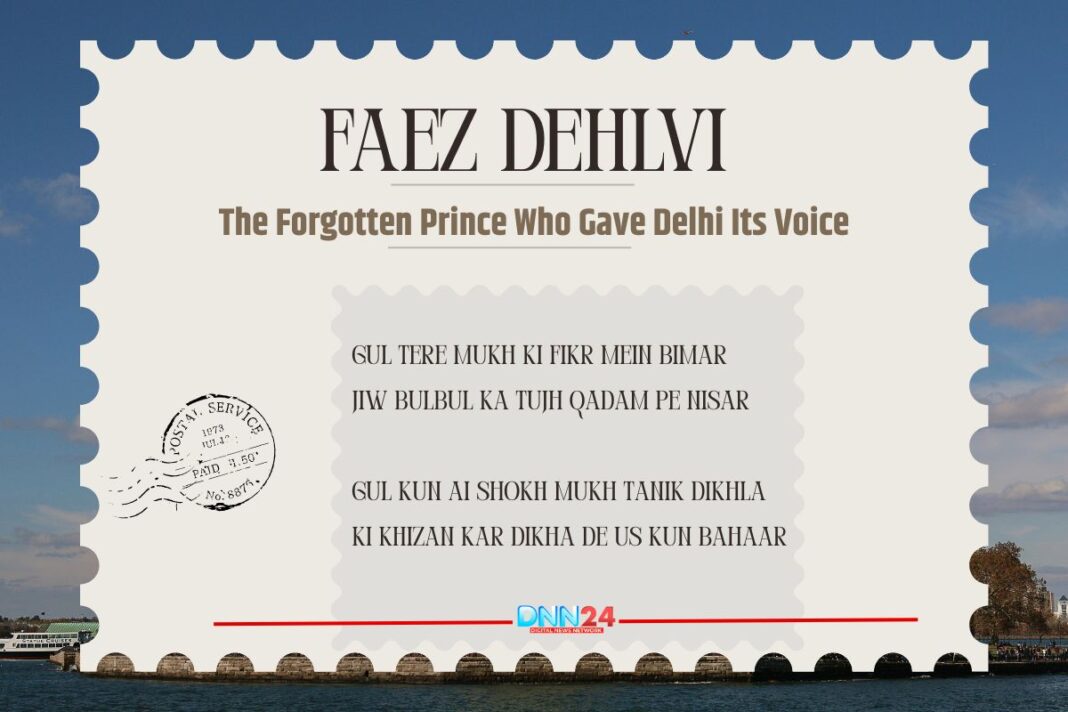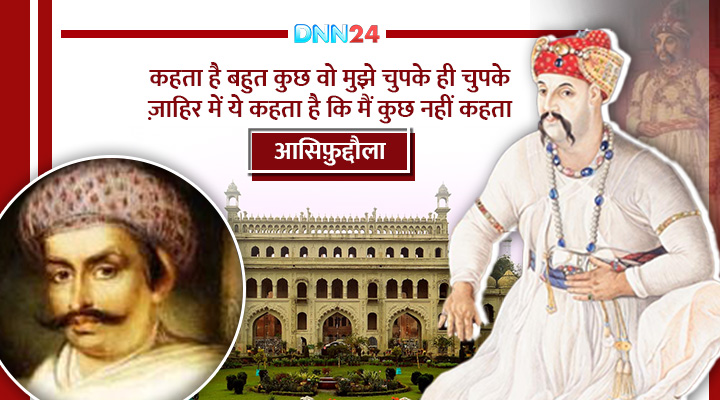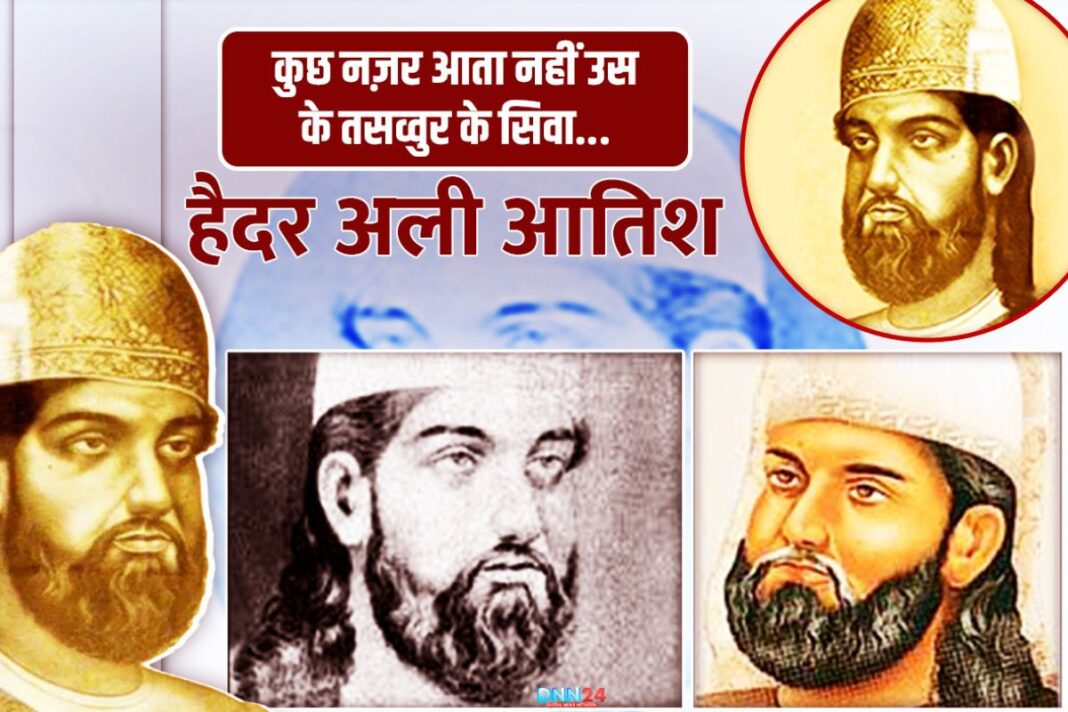Faez Dehlvi was born around 1690 in Shahjahan’s Delhi, in a home where power, manners and knowledge were part of daily air. His father, Zabardast Khan, was a high-ranking Mughal noble, judge and administrator in places like Jaunpur and Awadh, so from childhood Faez saw royal courts, heavy robes of honour and the strict discipline of service. In that busy political world, a boy with unusually soft eyes and a quiet nature slowly discovered that his true kingdom was not the court but words, rhythm, and emotion.
tujh badan par jo lal sari hai
Faez Dehlvi
‘aql us ne meri bisari hai
He studied under good teachers, learnt Arabic, Persian and the new North Indian language that people on the streets and in the bazaars were speaking, which later became Urdu. Imagine a young nawab’s son, sitting with scholars in the morning, listening to qawwals and storytellers in the evening, and slowly realising that both the kitabkhana and the chauraha were part of his soul. This duality shaped him in ways his family never expected, turning a boy born to command armies into a man who would command hearts through verse.
be-sabab hum se judai na karo
Faez Dehlvi
mujh se aashiq se burai na karo
Choosing the language of the people
In those days, respectable poetry was usually in Persian, the language of emperors and high culture, and Faez did write thousands of verses in it. But something inside him kept pulling towards the speech of ordinary men and women of Delhi, full of Hindi, regional dialects, Persian compounds and local idioms, and he did something quietly revolutionary: he began to write complete ghazals in this mixed, living tongue. Because of this, many scholars call him one of the earliest poets of North India to leave behind a full Urdu diwan, at a time when Wali Deccani’s pioneering work was only reaching the North.
tujh bina dil ko be-qarari hai
Faez Dehlvi
dam-ba-dam mujh ko aah-o-zari hai
The unheard side of this choice is its risk: a nobleman from an elite family stepping down from the marble platform of Persian and walking into the dust of the street, trusting that one day this common tongue would also be honoured as a literary language. His fellow nobles probably whispered about him, wondering why someone with his education and lineage would waste time on the rough speech of bazaars and mohallas, but Faez understood something they did not.
be-sabab hum se judai na karo
Faez Dehlvi
mujh se aashiq se burai na karo
A mind hungry for many worlds
Faez was not only a lover of verse; he was also a serious student of many sciences, including logic, medicine, geometry, physiognomy, and other disciplines respected in traditional Islamic scholarship. This wide reading gave his poetry an exceptional depth: when he spoke of a beloved’s face, he had actually studied faces; when he mentioned the body’s pain, he knew something about medicine; when he hinted at fate and choice, he had argued about it in books of philosophy.
jab sajile KHiram karte hain
Faez Dehlvi
har taraf qatl-e-am karte hain
Hidden behind some simple-looking couplets was a mind that had spent long evenings with heavy Persian classics and religious texts, and long nights looking at the same moon that labourers, fakirs and noble ladies also watched from their own rooftops. The untold story here is of a man quietly stitching together two worlds, serious scholarship of the madrasa and the playful music of the mehfil, so that an ordinary listener could enjoy his ghazal without guessing how much study stood silently behind each line. This combination made his work both accessible and profound, a rare achievement in any age.
jaan-e-ayyam-e-dilbari hai yaad
Faez Dehlvi
sair-e-gul-zar-o-mai-KHori hai yaad
Soft verses, strong decisions
On the surface, Faez’s poetry is famous for its simplicity, clarity, and beauty of expression, often describing divine love and the charm of beloved humans with a very gentle grace. There is no heavy wordplay or deliberate confusion; instead, there is a clean style that you can almost hear in an old Delhi gali, where Persian, Arabic and Hindi words sit easily side by side like neighbours sharing the same step.
teri gali mujh dil ko pyari lage
Faez Dehlvi
dua meri tujh man mein bhaari lage
But choosing such simplicity was itself a firm decision: in an age that respected dense, clever poetry, he insisted on writing in a voice that even non-scholars could feel, allowing a weaver, a small shopkeeper or a servant in a haveli to connect with ideas of ishq, separation and inner longing.
KHuban ke bich jaanan mumtaz hai sarapa
Faez Dehlvi
andaz-e-dilbari mein e’jaz hai sarapa
In this way, his diwan became a bridge between the court’s high culture and the emotional life of ordinary people, well before the Urdu ghazal became a mass passion in North India. He trusted that clarity was not weakness but strength, that speaking plainly about love and loss required more courage than hiding behind ornate phrases.
sajan mujh par bahut na-mehrban hai
Faez Dehlvi
kahan wo aashiqan ka qadar-dan hai
Behind the comfort: quiet cracks
From the outside, Faez’s life may look comfortable: noble birth, a good education, a respected position, and opportunities within the Mughal system. For a long time, he lived a relatively settled life, writing steadily and being known in select circles for his refined taste and cultured behaviour. Yet the later years brought a slow and painful turn: financial troubles began to press him, perhaps due to changes in the Mughal court, shifting power centres and the general decline of stability in north India.
ai jaan shab-e-hijran teri saKHt baDi hai
Faez Dehlvi
har pal magar is nis ki barmha ki ghaDi hai
This is the part of his story people rarely tell: how a man raised in abundance suddenly faced shortage, how a mind trained to solve the problems of philosophy could not easily grapple with the harsh mathematics of money and survival. The exact Delhi that had given him language, education and identity now became a place where every door seemed to close, where the old rules no longer applied, where a poet’s worth was measured in connections and favours rather than in the beauty of his verses.
zulf teri hui kamand mujhe
Faez Dehlvi
is mein bandha hai band band mujhe
When the world became too loud
Those financial difficulties did not just affect his lifestyle; they entered his inner world. Sources describe that in his last phase, Faez became mentally disturbed, showing symptoms that today might be recognised as extreme anxiety or hysteria. Instead of seeking more connections and favours, he moved in the opposite direction: he shut himself away, choosing seclusion, avoiding visitors, and almost imprisoning himself in his own space.
mera mahbub sab ka man haran hai
Faez Dehlvi
nazar kar dekh wo aahu nain hai
For a poet whose entire art depended on listening to language, to people, to his own heart, this self-isolation feels like a tragic final chapter, as if the same sensitivity that made his poetry beautiful also made the noise of a collapsing world unbearable. The man who once moved freely between royal mehfils and common chauks now sat alone in a dark room, unable to face the city he had loved so deeply. Delhi had become too harsh, too unpredictable, too different from the place where he had grown up composing verses about beauty and grace.
chaudhwan us chandar ka sal hua
Faez Dehlvi
husn mein badr ba-kamal hua
A quiet grave in Delhi
Faez Dehlvi passed away in 1738 in his beloved Delhi and was buried there, most likely without great royal ceremonies or grand headlines, just another thoughtful face disappearing into the soil of a city that has seen countless rises and falls. By then, the early shape of the Urdu ghazal had already been influenced by him and other pioneers, but history did not give him the same fame as later giants like Mir or Ghalib.
ai KHub-ru farishta siyar-anjuman mein aa
Faez Dehlvi
sarw-e-rawan-e-husn hamare chaman mein aa
The untold sadness is that the man who helped give Urdu a respectable diwan in the North is hardly remembered by the very language he served, his grave blending into a city where new buildings, flyovers and noise easily cover the footsteps of a quiet poet from the Mughal twilight. If you walk through old Delhi today, you will not find monuments to him, no plaques marking his contributions, no tourists searching for his last home. He vanished as quietly as he had lived, leaving behind only words.
meri jaan wo baada-KHwari yaad hai
Faez Dehlvi
waqt-e-masti girya-zari yaad hai
The legacy hidden in his language.
Today, only a part of his Persian work and around 500 Urdu verses are known, yet even this small, visible portion reveals his courage as a language-maker. He treated the mixed tongue of his time, Rekhta, not as something low, but as a fit vehicle for spiritual themes, complex emotions and delicate romantic imagery, and he filled it with local words without shame. This choice helped make Urdu feel at home in northern India, not as a foreign elite import, but as a warm, shared language in which Hindu and Muslim, noble and commoner, man and woman could all find their voices.
rast agar sarw si qamat kare
Faez Dehlvi
yar ki aankhon mein qayamat kare
In that sense, every time someone in Delhi or Lucknow hums a simple Urdu ghazal today, a thin, half-forgotten thread runs back to Faez Dehlvi’s mehfil, where a soft-spoken nobleman once decided that the language of the people was worthy of poetry, and quietly paid the price for being ahead of his time. His greatest triumph was not in the verses that survived, but in the permission he gave to future generations to write honestly in the language they actually spoke.
Also Read: Tomb of Sher Shah Suri: An Emperor’s Dream Palace Floating On Water
You can connect with DNN24 on Facebook, Twitter, and Instagram and subscribe to our YouTube channel.



